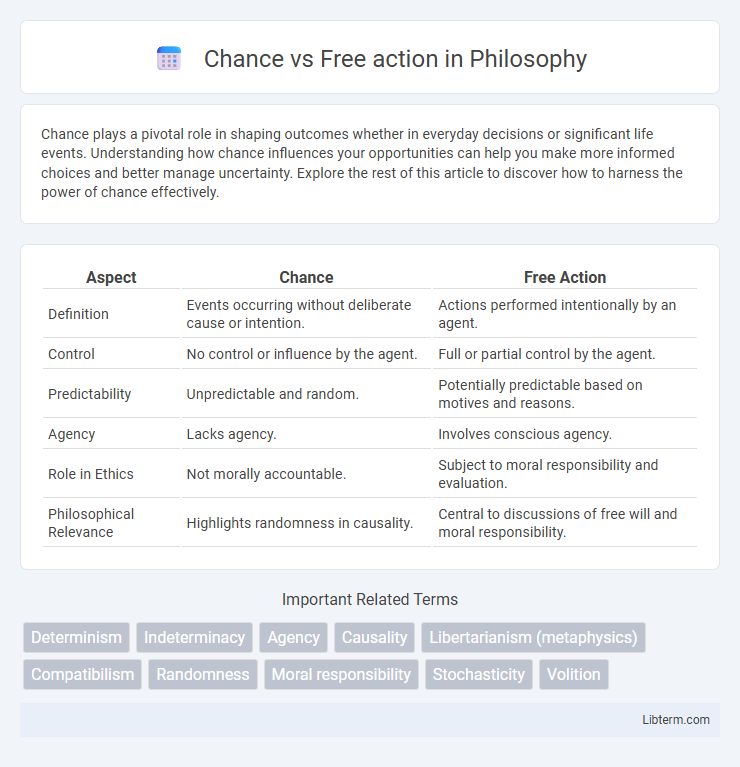Chance plays a pivotal role in shaping outcomes whether in everyday decisions or significant life events. Understanding how chance influences your opportunities can help you make more informed choices and better manage uncertainty. Explore the rest of this article to discover how to harness the power of chance effectively.
Table of Comparison
| Aspect | Chance | Free Action |
|---|---|---|
| Definition | Events occurring without deliberate cause or intention. | Actions performed intentionally by an agent. |
| Control | No control or influence by the agent. | Full or partial control by the agent. |
| Predictability | Unpredictable and random. | Potentially predictable based on motives and reasons. |
| Agency | Lacks agency. | Involves conscious agency. |
| Role in Ethics | Not morally accountable. | Subject to moral responsibility and evaluation. |
| Philosophical Relevance | Highlights randomness in causality. | Central to discussions of free will and moral responsibility. |
Understanding the Concepts: Chance and Free Action
Chance refers to the probability or likelihood of an event occurring, often quantified through statistics or randomness in various scenarios. Free action denotes a choice or behavior performed voluntarily without external coercion, emphasizing autonomy in decision-making processes. Distinguishing between chance and free action is crucial in fields like philosophy, psychology, and game theory to assess responsibility and predict outcomes.
Philosophical Definitions of Chance
Chance in philosophy denotes events occurring without deterministic causes, emphasizing randomness and indeterminacy in the universe. Free action involves intentional decisions made by agents possessing autonomy and rationality, distinguishing acts driven by choice from those influenced solely by chance. The debate centers on reconciling unpredictable chance occurrences with the existence of genuine free will and moral responsibility.
What Constitutes Free Action?
Free action in tabletop role-playing games refers to activities a character can perform without expending their limited action economy, such as speaking brief phrases, dropping an item, or interacting with environmental objects. These actions do not consume a character's standard, move, or swift action, allowing for multiple free actions within a turn, as long as the game master permits. The distinction between free and opportunity or charged actions is essential for managing turn efficiency and maintaining game balance.
The Role of Determinism in Human Behavior
Determinism suggests that all human actions, including chance and free actions, are influenced by prior causes, limiting true freedom of choice. Chance actions are often attributed to random, unpredictable factors, but even these can be traced to underlying deterministic processes. Free actions, in contrast, are perceived as intentional and autonomous, though determinism challenges this notion by emphasizing the causal chains shaping behavior.
Chance vs Free Action: Key Differences
Chance actions rely on probabilistic outcomes determined by external factors or randomness, while free actions can be performed at any time without cost or limitation within a game turn. Chance actions often involve dice rolls or probability checks that dictate success or failure, contrasting with free actions which are guaranteed and do not consume resources like action points or stamina. Understanding the key differences helps players strategize when to risk uncertain outcomes versus executing reliable, cost-free moves.
The Influence of Randomness on Decision-Making
Randomness significantly impacts decision-making by introducing elements of chance that can alter outcomes beyond an individual's control. In scenarios involving free actions, decisions are consciously made based on preferences and information, whereas chance infuses uncertainty that challenges predictability and rational planning. Understanding the balance between deterministic choices and stochastic events enhances strategic thinking and risk assessment in complex environments.
Autonomy and Moral Responsibility
Chance actions occur unpredictably without conscious intent, diminishing the agent's autonomy and challenging moral responsibility due to the absence of deliberate choice. Free actions, driven by rational deliberation and self-control, embody genuine autonomy, thereby grounding full moral accountability. Intentional control over decisions distinguishes free actions as the foundation for ethical evaluation and responsibility attribution.
Exploring Real-Life Examples: Chance or Choice?
Exploring real-life examples reveals the intricate balance between chance and free action in human decisions, such as career shifts influenced by unforeseen opportunities versus deliberate goal-setting. In medical diagnoses, chance plays a role through random genetic mutations, while patients' lifestyle choices exemplify free action impacting health outcomes. These scenarios underscore how chance events often set the stage for free actions to shape individual destinies.
Implications for Ethics and Society
Chance and free action shape ethical frameworks by influencing notions of responsibility and moral accountability. When actions are attributed to chance, ethical evaluations often shift towards mitigating risk and promoting fairness, while free actions emphasize autonomy and intentionality in moral decision-making. Societal implications include the design of justice systems and social policies that balance individual freedom with the unpredictability of chance events.
Conclusion: Balancing Chance and Free Will
Balancing chance and free will involves recognizing how random events and personal choices interact to shape outcomes. While chance introduces unpredictability, free will allows intentional decisions that guide direction and meaning. Understanding this dynamic enhances decision-making by integrating uncertainty with purposeful action.
Chance Infographic

 libterm.com
libterm.com